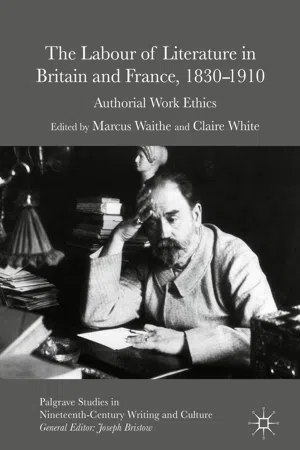Preface
The differences between French and British experience in the early nineteenth century are perhaps too easily enumerated. If not exactly a tale of two cities, the picture resembles a tale of two political cultures. France, famously, deposed its monarchy and aristocracy after the 1789 revolution, and it would experience a further constitutional ruction in 1848. Great Britain, by and large, contained emergent working-class energies, favouring reform over revolution. The relationship between the two countries thus exhibited an irresolvable lag, according to which France stood in the advance guard, and Britain was belated, or on another track entirely. In reality, a great deal of common ground brought the two nations into conversation. Dickens’s A Tale of Two Cities (1859)—and the work to which it owed its premise and its style, Thomas Carlyle’s The French Revolution: A History (1837; rev. 1857)—admitted a broad scope of shared concern, as well as an alertness to applicable, even if preventative, lessons.
These revolutionary tales dwelt on stark contrasts, as between cultures and classes, in the manner pioneered by the British social problem novel. In the hands of Benjamin Disraeli, this genre engineered a synthesis, or rapprochement, that inaugurated One Nation Tory gradualism. But the international dimension in the first two cases ensured a more invigorating and irresolvable dialectic, one that applied domestically as well as bilaterally. Carlyle feared the ‘mob’, but responded by humanizing the revolutionary crowd, investing it with a subject position that promoted the re-making of social ties. He was writing about France, but with a sense of urgency informed by the Chartist cause at home. The great crowd that assembled on Kennington Common in 1848 was the unavoidable physical embodiment of a demand that labour be rewarded with representation. French revolutionary precedent combined in this way with a revival of the Lockean principle that labour conferred property rights, and by extension personal sovereignty. Carlyle grew increasingly reactionary with age, but he was licensed in this matter by a Scots Calvinist conception of labour as the highest good in this world. On that basis he could endorse the clamour of the Chartist crowd, even as he ruled out a revolutionary solution.
The first two chapters of this volume examine British topics, either in the light of French precedent or cognate political demands based on the claims of labour. Those writing in this context faced the challenge of mediating between classes, but also of negotiating the pregnant gulf between French and British versions of the past and future. As Jan-Melissa Schramm observes, this conferred a keen sense of responsibility on the writer to manifest their efforts as political ‘work’. In 1905, A. V. Dicey remarked, accordingly, on the contribution of ‘novelists, newspaper writers, and philanthropists’ in bringing ‘the condition of the poor constantly before the eyes of their readers’ (quoted by Schramm). Such activity, as Richard Salmon demonstrates, could move closer to its referent, as working-class writers articulated the voice of labour for themselves, dramatizing, despite the ‘individualism’ of the Smilesian doctrine, ‘the collective labour of self-cultivation’. The third chapter, on George Sand, turns towards a French writer who, by contrast with the national stereotype, felt belated, locked into a political retrospect. ‘The ill-fated Second Republic’, writes Claire White, ‘had descended […] into a fratricidal class war; and with those bloody June days, Sand’s hopes lay crushed, as she put it, beneath the barricades’.
Apart from exploring working conceptions of political and literary representation, these contributors consider the representation of different kinds of work. Discussing Edward Paxton Hood’s The Literature of Labour (1851)—a volume sketching the lives of working-class poets whose title significantly reverses the title of the present volume—Salmon notes that Hood ‘did not dispute the right of authors from all classes to be viewed as “Productive Labourers”’, a point that recognizes not only the ‘dignity of literature’, but also its awkward dependence on a more recognizable doctrine, the contemporary Dignity of Labour. Schramm offers a different perspective on considering William Godwin’s despairing labour theory of value, according to which the ‘heartaches and industry’ of ‘twelve months’ labour’ could ‘be read by even the most sympathetic reader in a few hours’.
All three contributions chart a connection between the question of what qualifies as work and the ethics governing this recognition. Like Hood, Sand championed working-class writers, notably Charles Poncy and Jérome Gilland. In Schramm’s account, Eliot devoted an ethics of representation to her fictional records of particularity; but she also entered into the territory of political particularity through her ‘Address to Working Men, by Felix Holt’ (1868). Straining to give voice to the previously unvoiced, such efforts were prone all the same to charges of ‘patronage and patronisation’, as Schramm observes. The delicacy required in disrupting professional and social boundaries encounters a further complication once the cross-cutting politics of female work and female authorship are taken into account. As a ‘bourgeoisie’, White notes, ‘Sand’s fantasy of manual work appears doubly iconoclastic’.
